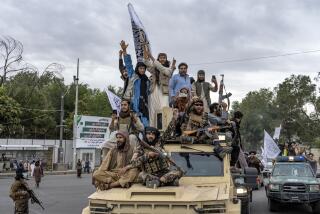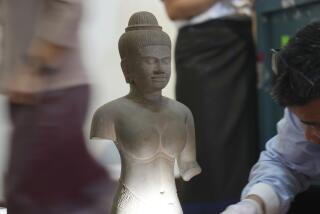Afghan Official Calls for Artifacts’ Return
PESHAWAR, Pakistan — An Afghan official appealed Monday for the immediate return of antiquities and artwork spirited out of the country during more than two decades of war, saying the nation is now ready to protect them.
“When the present Afghan government came to power, we had nothing; everything was destroyed,” Information and Culture Minister Raheen Makhdoom said at the inauguration of an Afghan cultural center in this city near the Afghan border. “Now we are trying to preserve our history and culture for the next generation.”
Makhdoom said the Afghan government is in talks with UNESCO, the U.N. cultural agency, on how to preserve, display and protect its antiquities.
Stolen artifacts include bronze, stone and ceramic pieces from the 4th century BC -- when Alexander the Great swept through southern Asia -- and rare Buddha carvings in the Gandhara style, a school of carving popular in northern India, Pakistan and Afghanistan about 2,000 years ago.
“It was only during the last few years that they were stolen, damaged and plundered,” he said.
After guerrilla fighters forced Soviet troops out of Afghanistan in the early 1990s, rival groups began fighting among themselves, looting artwork and antiquities and selling them.
The situation worsened under the Taliban in the mid-1990s, which banned music, some art, and destroyed antiquities it said were offensive to Islam. Some Muslims believe that artwork should not include depictions of the human figure. In March 2001, the Taliban destroyed two ancient cliff-side Buddhas.
UNESCO in April 2001 decided to temporarily relax its long-standing position against the purchase of artifacts that have been exported illegally and took the unprecedented step of encouraging the purchase of Afghan treasures by nongovernmental organizations in a bid to protect what was left of the country’s historical riches.
“We appeal to all those who possess antiques and the pieces looted from Kabul to return them to our Afghan people,” Makhdoom said, “because they’re not the property of any individual. These things belong to the Afghan nation.”
More to Read
Sign up for Essential California
The most important California stories and recommendations in your inbox every morning.
You may occasionally receive promotional content from the Los Angeles Times.










